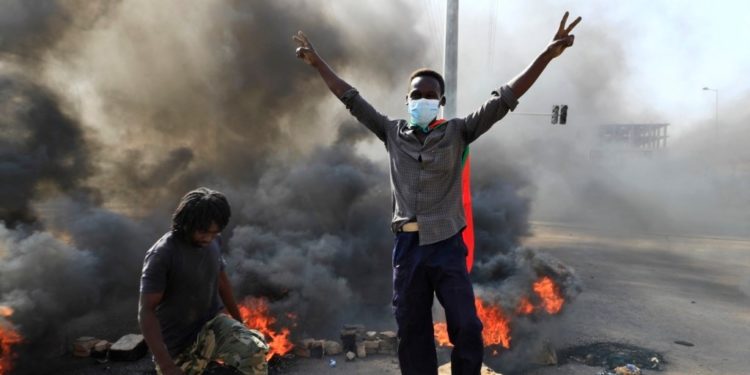WASHINGTON —
Sudan’s top general Lt. General Abdel Fattah al-Burhan has declared a state of emergency and dissolved the joint civilian-military council that has run the country for the past two years.
Al-Buran spoke at a news conference Monday after military forces arrested Prime Minister Abdalla Hamdok and other officials of the ruling Sovereign Council.
Sudan’s information ministry, which continued to publish statements online, reported that Hamdok was arrested for refusing to support a coup.
Protests broke out in Khartoum Monday following reports of Hamdok’s arrest. Journalist Michael Atit, who is in the capital of Khartoum, told VOA’s South Sudan in Focus that thousands of people, most of them young adults, are on the streets and marching toward the center of the city. He reported hearing gunfire and seeing tires burned in the streets.
Atit said most telecommunications in Khartoum have shut down, including the internet and radio stations. Only a state-owned television station was on the air, broadcasting patriotic music.
“Those in support of a military takeover will argue that this is a ‘correcting’ of the path of the revolution, but I think many who have had their hearts set on a transfer of power to a full civilian rule will see this definitely as a setback,” said Isma’il Kushkush, an independent journalist and former East Africa reporter at the New York Times. “I see this as a setback for the transition into a democracy,” Kushkush told VOA.
Hamdok, an economist and diplomat who has worked for the U.N., was named the country’s transitional prime minister in August 2019. He leads an interim government that took power following the ouster of longtime dictator Omar al-Bashir who was arrested during widespread street protests. The country is preparing for elections late next year and, under the constitution, Hamdok is forbidden from running.
But Hamdok has faced stiff resistance from elements of the country’s military. On September 21, forces loyal to al-Bashir used tanks to block a key bridge and attempted to seize power. The coup was put down and dozens of soldiers were arrested.
US embassy, AU Commission react
The U.S. embassy in Khartoum said Monday it is “gravely concerned by reports that the armed forces have taken action against Sudan’s civilian government, and condemns actions that are undermining Sudan’s democratic transition.”
The embassy called on “all actors who are disrupting Sudan’s transition to stand down, and allow the civilian-led transitional government to continue its important work to achieve the goals of the [2019] revolution.”
The African Union called for the release of all arrested political leaders and a resumption of talks between civilians and the military.
“The Chairperson reaffirms that dialogue and consensus is the only relevant path to save the country and its democratic transition,” said a statement from AU Commission Chair Moussa Faki Mahamat.
Last week, thousands of protesters took to the streets to voice concern about the prospect of a return to military rule. “This country is ours, and our government is civilian,” protesters chanted.
The Sudanese Professionals Association, an organization made up of trade unions instrumental in organizing the protests, called on the public Monday to go out and occupy the streets to protect the transitional government.
“It is a major blow to the democratic experiment in Sudan,” said Cameron Hudson, a senior fellow at the Atlantic Council’s Africa Center, an expert on Sudan and former White House Africa director.
The apparent coup attempt comes a day after U.S. Special Envoy for the Horn of Africa Jeffrey Feltman concluded two days of meetings in Sudan to underscore U.S. support for Sudanese democracy.
Hudson said Feldman received assurances from military leaders that they were committed to the work of the transitional government.
“The U.S. has invested more diplomatically in Sudan than almost anywhere else in the world in trying to prove that countries can move from autocracy to democracy,” Hudson told VOA. “This is a setback to transitions in Chad, Mali, and Guinea where the stakes are high, but which had not received nearly as much U.S. diplomatic attention as Sudan.”
Kushkush said there have been several events leading up to the coup Monday. However, despite earlier coup attempts and support for a military takeover, Kushkush said, there were also thousands of Sudanese in several cities and throughout the diaspora coming out in support of the democratization process.
“From day one of [the ousting] al-Bashir, the greatest fear that many Sudanese had was that the fate of the Sudanese revolution will be similar to that of the similar uprisings in the region and perhaps that the greatest fear is unfolding as we speak,” Kushkush said.









